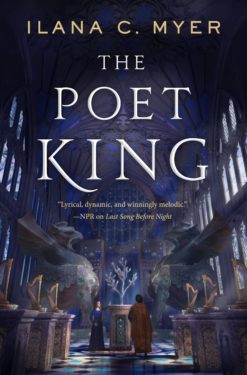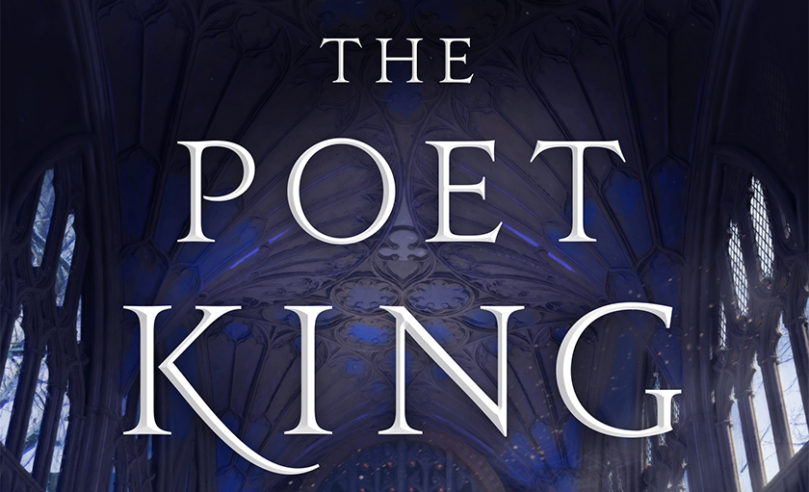 Writing one book is hard work, but writing a full blown trilogy? That’s a different kind of beast, according to Ilana C. Myer, author of The Harp and Ring Sequence. From a successful career in journalism to the 2016 presidential inauguration, take a look into one author’s journey from an idea to a successful series.
Writing one book is hard work, but writing a full blown trilogy? That’s a different kind of beast, according to Ilana C. Myer, author of The Harp and Ring Sequence. From a successful career in journalism to the 2016 presidential inauguration, take a look into one author’s journey from an idea to a successful series.
Ilana C. Myer’s lyrical, high fantasy series The Harp and Ring Sequence tells the tale of a gifted young poet, Kimbralin Amaristoth, who leaves her hate-filled family behind to pursue her dreams under an alias in the capital city of Tamryllin. But as the annual poetry and song festival begins, a dark power rises, causing a plague to spread. Can Lin and her new bard friends recover the lost magic of the Otherworld and enchant their harps with musical word-spells to restore balance to the land of Eivar?
Prophecies unfold, legends turn real, and a war of mythical proportions endangers the realm in Ilana C. Myer’s epic fantasy The Poet King, the follow-up to her critically-acclaimed Fire Dance, continuing The Harp and Ring Sequence.
By Ilana C. Myer
A writing career is like the magic drinking horn of Norse mythology. What looks like a decent-sized cup of mead is in fact fathomless, drawing on the depths of the ocean.
Similarly, the five years my books have existed in print represent a fraction of the time that went into them. My first novel, Last Song Before Night, came out in 2015. But the ideas first began to take shape in 2004. A college class in Celtic literature introduced me to the Celtic poets, and the concept of a society in which poets wield magical and political power.
The power of art was very much on my mind at that time—as a college student I’d come face to face with the realities of needing to make rent. Focusing on fiction instead of a stable career was clearly a bad idea.
Why am I compelled to do this? That became the question I looked to art to solve. Through the eyes of poet protagonists, I tried to make sense of my own desire to create. I worked on Last Song Before Night through years when life seemed to throw everything and the kitchen sink to get me to stop. Along the way, I picked up a journalism career and a spouse. I conquered my introverted tendencies to become a journalist in Jerusalem; my first gig was covering the religious city’s gay pride parade. I visited the shelters for African refugees in Tel Aviv and a jail in Lod. I started to get book review assignments and went looking for more overseas in outlets like the The Globe and Mail and The Huffington Post.
When the book was finished, I returned to New York to find an agent and publisher. The rest is history, though in the fine print you’d see it took two years to find an agent. “Epic fantasy is dead,” people told me in 2011; readers wanted steampunk with zombies or urban fantasy, and nothing else.
Then HBO’s Game of Thrones became huge and who knows—maybe that’s why I’m here, writing these words. Epic fantasy came back.
When Last Song Before Night came out, I learned that journalism hadn’t cured my introversion. It’s one thing to swallow your fear and talk to strangers. It’s an entirely different skill to stand in front of a group of strangers and perform. Fortunately, even someone who is buried at their desk ninety percent of the time can learn people skills. I’m living proof.
Everyone told me how horrible it would be to write the second book. They were right. The first year, I wrote three or four drafts of about 20,000 words. Each time I reached that mark I would discard the draft in a fit of disgust. I was writing the book that I thought was expected of me: It was the second book of a fantasy trilogy, so that called for a siege battle—right? There was the weak king, his seductive queen, a sinister vizier. All so cliché I wanted to puke.
Sometime in the second year, I was chopping vegetables when a scene came to me with such profound impact that I dropped what I was doing to write it down. I saw a palace garden where my characters revealed their true selves. All through that year, my subconscious was at work. It gave me what was missing—the characters’ voices. Once I had them, Fire Dance took shape.
With The Poet King, I knew it would be necessary to return to the origins of the magic that was about to overrun a kingdom. Fire Dance had introduced elements of Al Andalus and Middle Eastern magic to mingle with the Celtic and medieval French influences in Last Song. Now it was time to tie everything together in a finale.
It was also January 2017. Sometime around the president’s inauguration, a chapter came to me: I saw my female protagonist infiltrating the new king’s palace, determined to get close to him—and take him down.
The Poet King grew more gradually after that fevered first chapter, fed on inspirations old and new. My aim throughout was to write a story that would elevate all that had come before and give each character a fitting last turn on the stage.
Someone at a book event once asked how my life has changed since I became a published author. For me the answer was simple: My life is meaningful now that I’m doing what I love.
Writing this trilogy changed me. I look forward to the next thing.
Order Your Copy:











